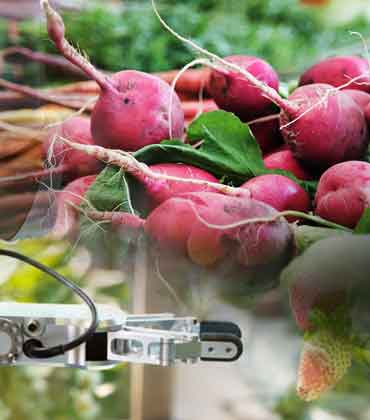THANK YOU FOR SUBSCRIBING
By Aimee Roy, Director of National Distributors, Stonewall Kitchen Family of Brands
Strategies for Success in the Ever-Changing Food Industry
By Kristen Thompson, SVP, Business Unit President - Frozen & Vegetables, B&G Foods
The Pursuit of Excellence: Evaluating the Palatability of...
By Enrique Leon, AI Enterprise Architect, American Sugar Refining Inc
Enhanced Precision Agriculture using Cloud Based AI

How Can Sustainable Food Affect Food Fraud?
Tanja Dinic, Director Of Internal Audit For Food Safety, Fortenova

 Tanja Dinic, Director Of Internal Audit For Food Safety, Fortenova
Tanja Dinic, Director Of Internal Audit For Food Safety, FortenovaThe food industry considers the safety of its products as its primary concern. Over the years, industry and regulators have developed food safety management systems that are accepted globally and proven effective against accidental contamination. However, HACCP principles have not been routinely used to detect or mitigate deliberate, fraudulent actions on a system or process.
These actions include deliberately adulterating or misrepresenting food ingredients and packaging motivated by economic gain. To mitigate food fraud, food business operators are legally obligated to implement and maintain food traceability and quality at all stages of food production, processing, and distribution to ensure food authenticity.
Food Fraud Management System provides us with evaluation steps to detect suppliers’ and products’ vulnerabilities through the supply chain and establish effective mitigation measures and strategies.
Ease of fraudulent activity grows with the physical nature of the product, cost, and complexity of the fraudulent process (location, processing machinery, costs of production, packaging cost, distribution cost), staff involvement in the fraudulent activity (number, ease of concealment, number of locations), packaging formats (packaging of raw material and adulteration). In addition to the criteria mentioned above, the level of regulatory control of the country of origin and the level of corruption in the country are also previously connected with food fraud.
Industries develop a risk assessment to detect fraud through their VACCP teams. However, growing consumer interest in sustainability and ethical practices can positively and negatively affect food fraud.
While sustainable practices aim to improve food production’s environmental, social, and economic aspects, they can also introduce new challenges and vulnerabilities and may impact food fraud. Sustainable food systems often involve diverse and complex supply chains, with products from various regions and producers. This complexity can make tracing and monitoring every supply chain step challenging, potentially creating opportunities for fraudulent activities.
Sustainable practices may lead to increased demand for specialty or niche ingredients. This heightened demand can create opportunities for fraud, as unscrupulous actors may attempt to substitute or adulterate these ingredients to meet market demands. The economic benefits of sustainable food production may attract actors seeking to exploit the premium prices of sustainable and organic products.
"Regulatory authorities are increasingly scrutinizing greenwashing practices, and there is a growing awareness of the need to combat deceptive marketing"
On the positive side, sustainability initiatives often emphasize transparency and traceability. Implementing robust traceability systems can help deter fraud by making it easier to identify the origin of ingredients and track their journey throughout the supply chain.
To effectively address the intersection of sustainability and food fraud, the industry needs to implement comprehensive risk assessments, strengthen traceability systems, and enforce standards and certifications.
Additionally, ongoing education and awareness efforts for stakeholders across the supply chain can contribute to a more resilient and fraud-resistant sustainable food system.
What is the connection between greenwashing and food fraud?
Greenwashing and food fraud are two distinct concepts. Still, there can be a connection regarding deceptive practices within the food industry, especially with products marketed as sustainable or environmentally friendly.
Greenwashing refers to misleading consumers about a company’s environmental practices or the environmental benefits of a product or service. It involves overstating or falsely advertising a commitment to sustainability to enhance the brand’s image or marketability.
In the context of food, Greenwashing in the food industry can overlap with sustainable food claims, where products are marketed as eco-friendly, organic, or ethically produced. Deceptive marketing practices may involve exaggerating the use of sustainable practices or falsely claiming certifications to make the product appear more environmentally friendly than it actually is.
So, what is the risk? Greenwashing poses a risk to consumers who seek out sustainable and eco-friendly products. If false claims mislead consumers, they may inadvertently support products or companies that do not align with their values, undermining the credibility of the entire sustainable food market. Companies might falsely claim certifications, use misleading labels, or engage in counterfeit schemes to give the appearance of meeting sustainability standards when, in fact, they do not.
Both greenwashing and food fraud can erode consumer trust. If consumers discover that they are misled about the sustainability or authenticity of a product, they may become skeptical of future claims and lose confidence in the entire food industry.
Regulatory authorities are increasingly scrutinizing greenwashing practices, and there is a growing awareness of the need to combat deceptive marketing. This increased regulatory focus may extend to ensuring that sustainability claims are accurate and backed by genuine efforts throughout the supply chain.
Read Also















